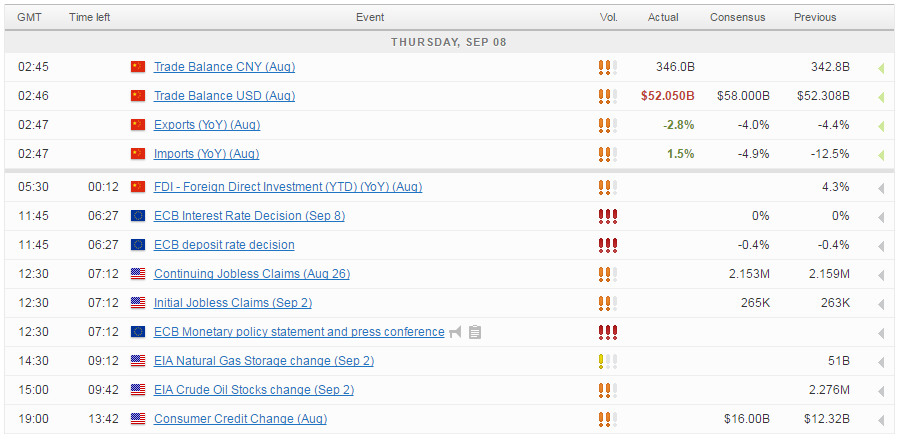European equity markets are expected to open relatively flat ahead of the ECB monetary policy announcement on Thursday, with investors appearing to opt for caution despite no new action being anticipated.
The ECB finds itself between a rock and a hard place at the moment. Growth and inflation continues to elude the euro area and we’re likely to find out today, when the central bank releases its latest economic projections, that Brexit has only made that situation more dire, albeit potentially less so at this stage than many would have thought a couple of months ago.
ECB to Update Forecasts and Drop QE Hints
The problem is that not only is further action opposed by some of the more hawkish policy makers – most notably Bundesbank Head Jens Weidmann – the ECB is becoming increasingly constrained by the number of assets it can purchase under the rules of the quantitative easing program. Therefore, before any increase in bond buying is announced, it must first alter the eligibility criteria, which is easier said than done. Even without an increase, the rules of the program may have to be altered, something that would require the approval of Germany which is unlikely to come easy.
There are a number of ways that the ECB could resolve this issue, such as unlinking the quantity of bonds it purchases to the size of the economy, allowing the purchase of debt yielding below -0.4% – the deposit rate, thereby imposing potentially large losses on the ECB – increasing the proportion of a countries issuance above 33% or adding bonds with maturities that don’t fall under the current program. The problem is that each of these options is likely to face strong opposition for one reason or another.
Until the issue is resolved, I think the ECB will hold off on announcing further stimulus measures and may even wait to extend the current QE program beyond March next year, when it is due to expire. There are other options available to the ECB, such as increasing the purchase of corporate bonds or other debt securities, but the effectiveness of such actions is debatable. Instead the central bank is likely to look for a way around the bond buying program which may take a little longer. Of course lowering the deposit rate deeper into negative territory is an option but again, we have to wonder how big a difference such a cut would make, especially when weighed up against the risks and the political sensitivity to such a move.
For a look at all of today’s economic events, check out our economic calendar.
Content is for general information purposes only. It is not investment advice or a solution to buy or sell securities. Opinions are the authors; not necessarily that of OANDA Business Information & Services, Inc. or any of its affiliates, subsidiaries, officers or directors. If you would like to reproduce or redistribute any of the content found on MarketPulse, an award winning forex, commodities and global indices analysis and news site service produced by OANDA Business Information & Services, Inc., please access the RSS feed or contact us at info@marketpulse.com. Visit https://www.marketpulse.com/ to find out more about the beat of the global markets. © 2023 OANDA Business Information & Services Inc.



